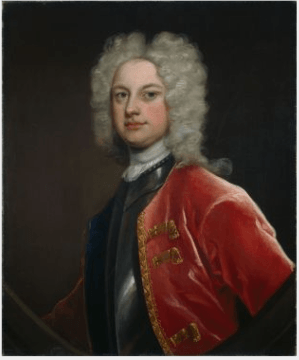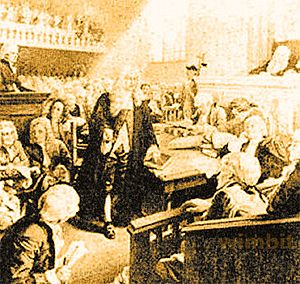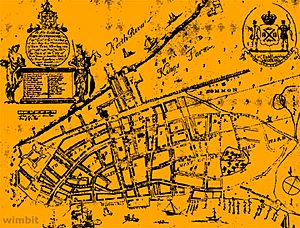William Cosby facts for kids
Quick facts for kids
William Cosby
|
|
|---|---|
 |
|
| 24th Colonial Governor of New York | |
| In office August 1732 – March 1736 |
|
| Monarch | George II |
| Preceded by | Rip Van Dam |
| Succeeded by | George Clarke |
| 6th Colonial Governor of New Jersey | |
| In office August 1732 – March 1736 |
|
| Monarch | George II |
| Preceded by | Lewis Morris, President of Council |
| Succeeded by | John Anderson President of Council |
| Personal details | |
| Born | 1690 Stradbally Hall, Queen's County, Ireland |
| Died | 10 March 1736 New York City |
| Spouse | Grace Montagu |
| Children | William, Grace, Elizabeth, Grace, Henry |
| Profession | Army Colonel, Governor |
Brigadier-General William Cosby (1690–1736) was an Irish soldier. He served as the British colonial governor of New York from 1732 to 1736. During his time as governor, Cosby was known as one of the toughest leaders in the Thirteen Colonies.
In 1735, Cosby accused a newspaper publisher named John Peter Zenger of printing untrue and harmful stories about him. Despite Cosby's efforts, Zenger was found innocent. This important case helped to establish the idea of freedom of the press in America.
Contents
Early Life and Military Career
William Cosby was born in 1690 in Stradbally Hall, Queen's County, Ireland. His family had moved to Ireland from Britain in 1590. His mother came from another important family in Ireland.
In 1709, when he was 19, William Cosby traveled to Italy. He earned money by playing card games. The next year, he joined the British Army in Spain. He served under General Stanhope. Over the years, he moved up in the army. He became a colonel of the Royal Regiment of Ireland in 1717.
In 1711, Cosby married Grace Montagu. She had important connections at the British court. They had five children: William, Grace, Elizabeth, another Grace, and Henry. All of them were born in Britain. Both of their sons later joined the military.
Governor of New York and New Jersey
When George II became King of Britain, he moved New York's governor to another colony. On January 13, 1732, King George II chose Cosby to be the "Captain General & Governor in Chief" of New York and New Jersey. An acting governor, Rip Van Dam, served until Cosby arrived in America.
It took 13 months for Cosby to arrive in New York. At that time, the colony of New York had about 50,000 people. New York City itself had only 9,000 people. But its port was very busy with docks and shipyards.
Cosby's Land Grant
On January 2, 1734, King George II gave Cosby a large piece of land. It was 22,000 acres along the Mohawk River in what is now Herkimer County, New York. This land was named Cosby's Manor in 1736. Later, it was sold to Philip Schuyler and others. The cities of Utica and Schuyler, New York were later built on this land.
While serving as governor, Cosby was promoted in the military. He became a vice admiral in September 1735. He was made a brigadier general in November 1735.
Disputes Over Pay
The salaries of British colonial governors often caused arguments. When Cosby arrived in New York, he demanded that the acting governor, Van Dam, give him half of the salary he had received. Van Dam said he would only do this if Cosby gave him half of the money Cosby had earned while still in England.
Cosby took Van Dam to court. He wanted the case to be decided by a judge, not a jury. This type of court process was not popular in the colonies. People saw it as unfair. The Chief Justice, Lewis Morris, knew what the public thought. He dismissed Cosby's case in April 1733.
Cosby got back at Morris by firing him from his job. He also removed Van Dam from the provincial council. Cosby then named James De Lancey as the new chief justice. Morris later wrote about his side of the story in The New York Weekly Journal, a newspaper that opposed Cosby. This event was important because it led to the Zenger trial. It also made Cosby seem like a very unfair ruler.
Meanwhile, Cosby made sure he got a good salary. He did this by refusing to hold new elections for the New York General Assembly. The assembly members then voted to give him five years of support.
Political Parties Emerge
After Lewis Morris was removed from his job, two main political groups formed:
- The Court Party or Tory group. This group included people like Adolphe Philipse and Philip Van Cortlandt. It was led by De Lancey.
- The Country Party or Morrisites. This group included Lewis Morris, Rip Van Dam, and James Alexander.
These two groups became very important in New York politics. Both groups were made up of wealthy landowners. However, the Court Party was more focused on British interests. The Country Party focused more on developing the colony itself.
In 1735–1736, Morris went to London to talk to the King directly. He wanted Cosby fired and himself put back as chief justice. He did not succeed in either goal. However, Morris was later made governor of New Jersey.
Land Disputes in Hopewell
As governor, Cosby illegally took land from colonists in Hopewell, New Jersey. He gave this land to his supporters. Cosby forced the settlers to buy their properties back. Then, as the colony's top judge, he rejected their complaints.
The former settlers fought back. They attacked the new landowners and government officials. Cosby then offered a reward of 30 pounds to anyone who would help catch those responsible.
Relations with Native Americans
Cosby was very focused on making money and controlling politics. Because of this, he did not pay enough attention to issues on the frontier. Military groups were easily defeated by the Chickasaws, Catawbas, and Cherokees. The Iroquois tribes used Cosby's lack of attention to their advantage. They made their Six Nations confederation a stronger military force.
The Zenger Case
The New York Weekly Journal was a newspaper that opposed the governor. It supported the colonists and was against the King's rule. The Morrisites financially supported it. John Peter Zenger, a German immigrant, started it in 1733. Its strong articles were mostly written by Morrisites like James Alexander, who wrote anonymously.
The newspaper's most talked-about articles were about:
- Morris being removed from his job.
- Cosby trying to cheat in the 1734 elections.
- Songs after the election that made fun of the King's supporters.
- Cosby taking collected taxes.
- Cosby taking Native American lands.
- French ships being allowed to dock in New York's harbor.
In November 1734, Cosby ordered his men to burn four issues of the newspaper. He said they contained harmful material. On November 17, Zenger was arrested for printing false and harmful things about Cosby. But his arrest did not stop the Journal. His wife, Anna, continued printing the newspaper.

Cosby worked through De Lancey to stop Zenger's local lawyers from defending him. He urged the jury to punish Zenger. But the Morrisites hired Andrew Hamilton, a famous lawyer from Philadelphia. Hamilton argued that the newspaper could only be punished if what it printed was false. The idea he presented is still important in modern United States law: a newspaper is only guilty of libel if it prints lies.
Zenger was found innocent by the jury on August 18, 1735. De Lancey did not try to change that decision. The Zenger case did not completely stop people from being charged for printing harmful things. However, it set an important example for freedom of the press.
Death
Cosby died from tuberculosis on March 10, 1736. He passed away in the Governor's House at Ft. George, which is now Battery Park in New York City.
He was first buried in a special vault at Ft. George's chapel. But in 1788, his remains were moved to an unmarked grave. This grave is at St Paul Church's Cemetery in New York. The remains of the Earl of Bellomont, another New York governor, were also moved there.
George Clarke, who was the lieutenant governor, took over Cosby's job. He was a moderate supporter of the King's party. He again disappointed Van Dam, starting another political argument. This happened even before his appointment was officially confirmed by the King.
Legacy
People in the 1700s believed that Governor William Cosby had two main goals. These were to protect British interests and to make himself rich. The British Crown's governors in British North America were rarely popular. But for some colonists, Cosby became a symbol of how unfair governors could be. Lewis Morris, Cosby's political opponent, said Cosby's rule was very harsh. He meant that Cosby did not care about the wishes of the people he governed.
Cosby's time as governor was not easy for colonial New York. However, the struggles of the 1730s helped to define the roles of the governor, the assembly, and the courts in politics. They also helped create the colony's first political parties. Historian Michael Kammen said Cosby's time was a period of "political awakening and modernization" in New York politics. Once the main problems were fixed, politicians could focus on important issues. This also helped more people get involved in political activities.
 | Tommie Smith |
 | Simone Manuel |
 | Shani Davis |
 | Simone Biles |
 | Alice Coachman |


